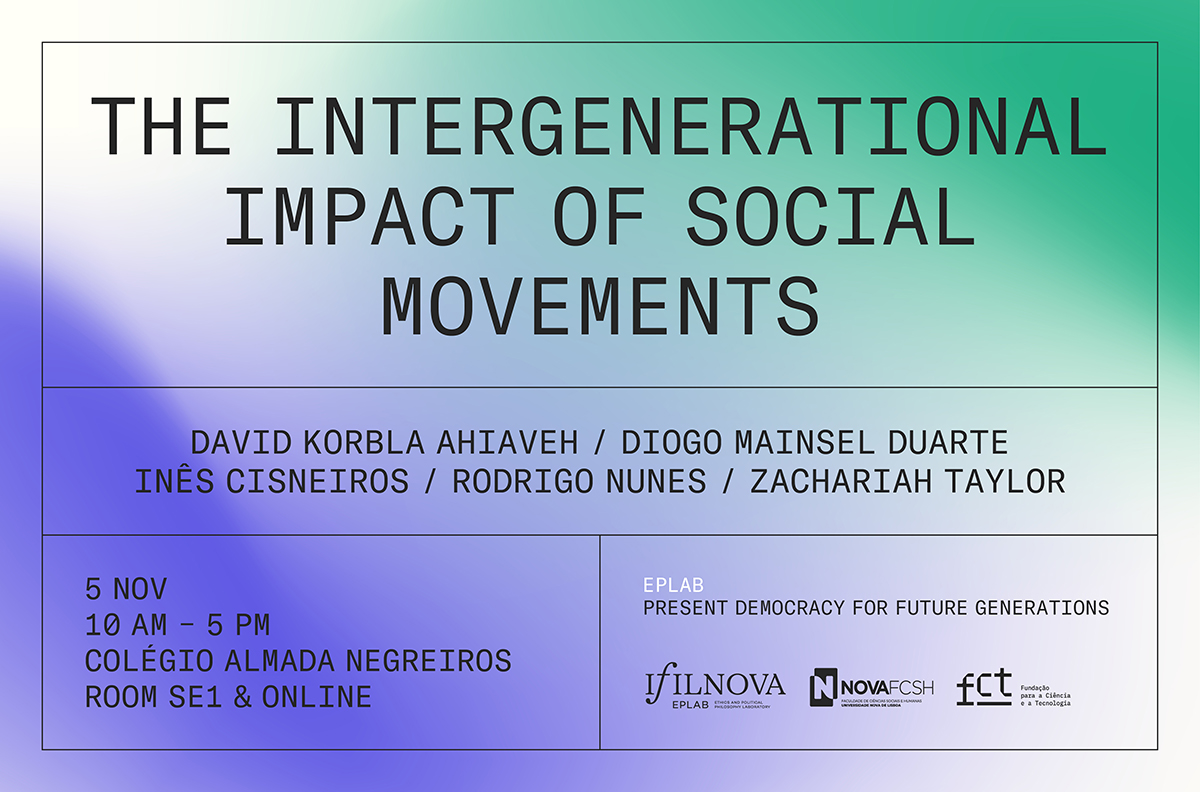The Intergenerational Impact of Social Movements

When citizens are reduced to the role of voters and relegated to the background of political action as passive bench warmers, their agency can be fetishized as a rare phenomenon to be seen only in times of crisis and otherwise deemed somewhat futile. The organizing of social movements is often associated with urgent and immediate causes that appeal to the sentiments of agents mobilized through emotional activation and thereby may rely on fragile organic/spontaneous structures and quickly succumb to short-lived hopes, rendered irrational, ephemeral, and ineffective. Because unsolved problems often lay grounds for successive experiences, repeated attempts can also be met with condescendence and suspicion instead of solidarity and access to adequate means for action.
However, diverse forms of democratic practice are required to face democracy’s vulnerabilities (namely its myopia or presentist bias) and help maintain its virtues in check by practicing its values. Social movements have provided answers to democratic limitations in terms of responsiveness to preferences, redefining government priorities, and even reclaiming governing power in the face of abuse, which are key features of democratic systems. The subject of most well-known movements have been long-time issues such as housing (dating from the industrial era), health/environment (dating from the 70s), as well as common forms of inequality/discrimination (Black Lives Matter, #metoo, etc.), so they not only help maintain structural issues in the political agenda but also direct collective action and mutual aid where formal government is unfulfilled.
In this workshop, we intend to discuss the intergenerational impact of social movements not just as a manifestation of longterm struggles, but actually as a standard form of democratic practice that bears lasting effects on political subjectivization. Their role in the consolidation of modern state and hegemonic notions of democracy, its consequences in larger political landscapes, the continuities and discontinuities of said movements, and how they benefit or hinder intergenerational relationships and dialogues are some of the topics we shall address.
This workshop is organized as part of the EPLAB research project “Present Democracy for Future Generations” (PTDC/FER-FIL/6088/2020).
Each presentation shall take up to 20 minutes, followed by another 20 minutes for open discussion (Q&A). For anyone wishing to attend in person, the group will be at room SE1. Bring your own laptop/mobile phone and audioset for Zoom connection and perfect hearing!
If you are interested in joining the Workshop or require further information, including the Zoom link for the online session, please write to ines.cisneiros@gmail.com.
CONVENOR: Inês Cisneiros (NOVA University Lisbon)
Speakers
David Korbla Ahiaveh (dkahiaveh@st.ug.edu.gh)
PhD Student in Philosophy, University of Ghana, Legon and Erasmus+ scholarship, University of Hradec Kralove, Czech Republic
Diogo Mainsel Duarte (diogo.mainselduarte@gmail.com)
Researcher at Instituto de História Contemporânea – IHC (FCSH-UNL)
Inês Cisneiros (ines.cineiros@gmail.com)
Researcher at IFILNOVA’s EPLab research project “Present Democracy for Future Generations” (PTDC/FER-FIL/6088/2020)
Rodrigo Nunes (rgnunes@yahoo.com)
Professor of Politics and Organisation at the University of Essex, UK / PUC-Rio
Zachariah Taylor (ztailor@edu.ulisboa.pt)
PhD Student in Philosophy, University of Lisbon, Researcher at Praxis
Programme
05/11/2024
9h45 Greetings and opening remarks
10h00–10h40 Inês Cisneiros
“Learning to Say Please: How Democratic Practices Can Degenerate Over Time”
10h40–11h20 David Korbla Ahiaveh
“Paradox of Democracy, Social Movements, and Duties We Owe Future Generations”
11h20–11h40 Coffee break
11h40–12h20 Diogo Mainsel Duarte
“A Revolutionary Continuum: Prefiguration, Revolution and Anarchism in Portugal”
12h20–13h00 Zachariah Taylor
“Thinking Destitution Intergenerationally: The Radical Heritage of Social Movements”
13h00–14h30 Lunch
14h30–15h45 Rodrigo Nunes
“The Intergenerational Transmission of Practices of and Demands for Justice: The Case of Organisation”
16h00 Final Remarks
Event supported by the Foundation for Science and Technology (Fundação para a Ciência e para a Tecnologia) of the Portuguese Ministry of Education and Science under the project “Present Democracy for Future Generations” (PTDC/FER-FIL/6088/2020).

